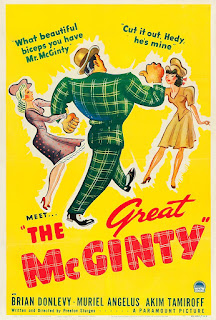IMDb plot summary: Love blooms between a sympathetic attorney and the comely shoplifter he has taken home for the Christmas holiday.
Directed by Mitchell Leisen. Starring Barbara Stanwyck, Fred MacMurray, and Beulah Bondi.
Remember the Night Stars Fred MacMurray as a prosecuting attorney and Barbara Stanwyck as the petty thief he's prosecuting right before Christmas. Sensing in the judge a streak of Christmas goodwill, he successfully moves to postpone the trial until after Christmas. He feels bad, however, about Stanwyck being stuck in jail throughout the holidays and so offers to pay her bail. Upon finding out she doesn't have anywhere to go for the holidays, he invites her home to visit his family in Indiana for one last holiday before she's locked up. This is a weirdly sweet holiday movie that is a little jarring considering I most know this pairing from their work in Double Indemnity, which is definitely less than sweet. Unfortunately once they've established the sort of unorthodox dynamic, the rest of the movie plays out much more like a typical romance. The ending does go in a slightly different direction than I expected, but thinking back on it that's the only part that really took any chances with the story. It's probably worth seeing especially if you are fan of either of the stars, but it didn't blow me away.
How it entered my Flickchart:
Remember the Night < The Keep
Remember the Night > BASEketball
Remember the Night > The Hills Have Eyes (1977)
Remember the Night < Venom
Remember the Night > Onibaba
Remember the Night > Looking for Comedy in the Muslim World
Remember the Night < Notorious
Remember the Night > Marathon
Remember the Night > Moonstruck
Remember the Night > Anna Christie
Remember the Night > Escape from Mr. Lemoncello's Library
Final spot: #2024 out of 3548, or 43%.










